A pneumatic device called an air compressor exchanges power with the potential energy available in compressed air. But how do they work? Can An Air Compressor Get Wet? Actually, yes, a wet air compressor is possible. But how? In this article, we will explore!
You must make sure that the various components of your air conditioner are properly maintained if you want it to work constantly and efficiently. You might have infrequently noticed some water droplets on the compressor or condensation and moisture in your compressed air system.
Actually, dry compressed air is crucial, but if you don’t get it, your system will begin to load up with water. Water is removed from compressed air during the compression process; this water can then end up in tanks, airlines, and pneumatic machines. However, let’s discuss a thorough explanation of the problem and its solution below. Keep reading to explore more details!
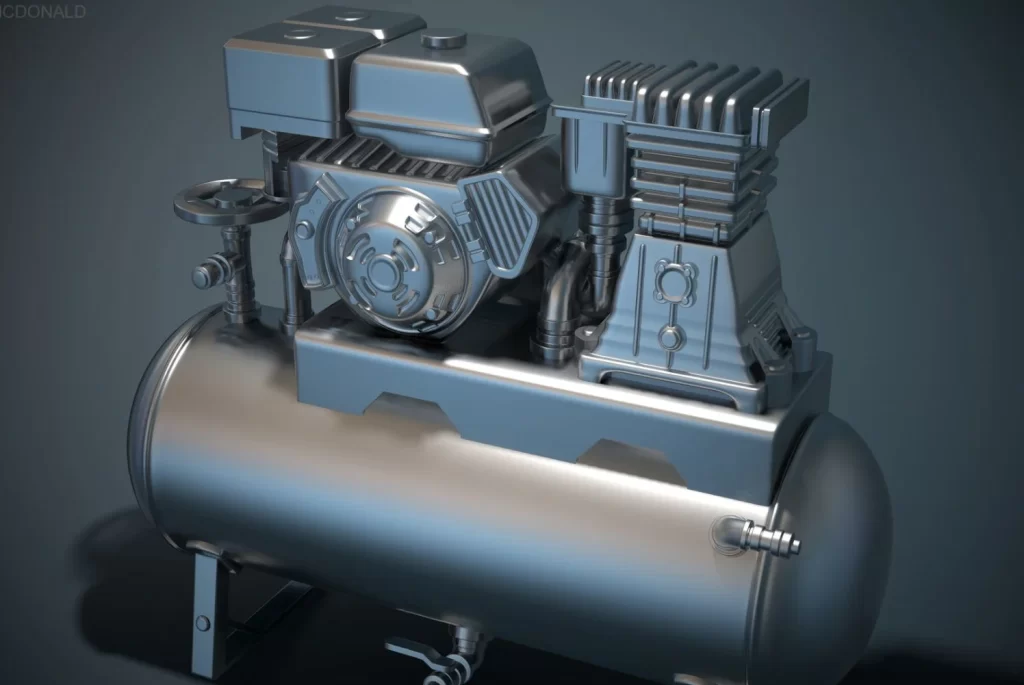
Is it bad if an air compressor gets wet
The main threat to any air compressor, generally speaking, is moisture. You ensure the durability of any machine by covering it from rain or snow, as it might cause rust issues.
Actually, wetness might happen at any time, which is quite natural. In the case of your air conditioner’s exterior unit sometimes becoming completely wet, either accidentally from rain or by your own willful disobedience, generally, air conditioner compressors pump gas instead of developing liquids.
In essence, it doesn’t matter if your air conditioner gets wet. The AC unit won’t be affected or function worse because of the water. So, stop worrying about any risk to your mechanical or electrical parts of the compressor.
Looking for the best air compressor for LVLP Spray Gun? See detailed review and top picks in the related article.
Can an air compressor get wet: Reasons for that
- When air is compressed, both the pressure and temperature will rise.
- Moisture is a natural component of air. A humid day might make you aware of it, while a mild day might not. Humidity may vary according to the weather.
- Moisture is the water vapor molecules that are strewn throughout the gas-type particles. The air compressor draws ambient air from the atmosphere into itself.
- Compressed air cannot contain the same quantity of water vapor as ambient air; this is a fundamental property of compressed air.
- As it enters the compression room, ambient air compresses like water squeezed off a sponge.
- Additionally, the air becomes colder as its volume lowers due to water vapor escaping while also being squeezed. Dew will form on the compressor pipes.
What happens if an air compressor gets wet: Consequences
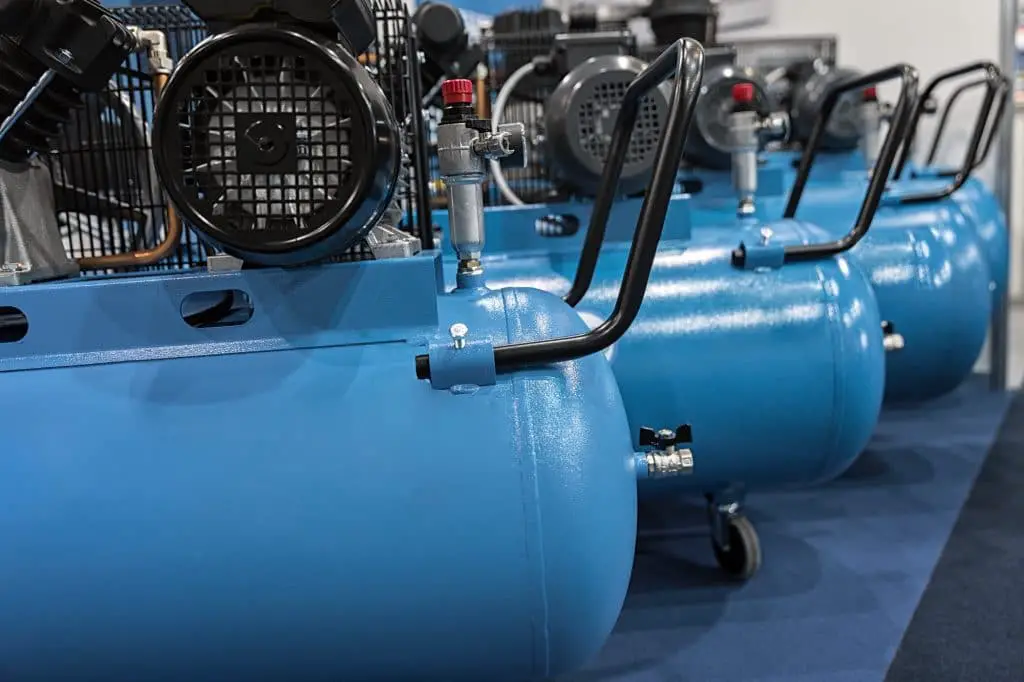
1. Slow performance
When the compressor gets wet, it impacts the overall performance of the machine, hastens its wear out, or sometimes ruins the entire machine.
2. Corrosion or rust
Overheating causes condensation to form inside, which eventually leads to rust.
3. Electrical issues
When water gets into contact with electrical parts like motor windings or contact terminals, it can corrode them and lead to electrical problems.
4. Short circuit problem
Additionally, water leaks inside the pump motor can result in short circuits that could destroy electrical parts or even cause fires.
5. Damage to mechanical parts
Excessive moisture can damage internal and external mechanical parts as well.
6. Ice form issues
When damp compressed air is repeatedly exposed to cold conditions, there is a possibility of ice accumulation, which can damage the machine at any time.
7. Prevent the piston
Therefore, any liquid in the piston will affect its best performance and complete stroke as it works to compress the air in the air chamber and increase the pressure in the engine.
8. Valve issues
Most of the time, liquids that enter the machine will cause damage to the intake and exit valves. Centrifugal or axial turbine compressors, like jet engines, can contain a specific amount of water inside without using valves.
9. Water and air hose matter
Compressed air is distributed by air hoses for pneumatic devices. To manage high pressures and prevent leaks and breakage, air hoses should be incredibly powerful. If you try to use the compressor when there is water in the hose, the compressed air will release the water.
How is water developed when compressing air
When the compressed air becomes cool, the additional water is driven out as a liquid, and it can no longer carry the same amount of water vapor. Usually, the pressurized air cannot hold much water. Water vapor condenses back into a liquid as the pressure rises.
The water in the air helps to condense inside the compressing air function. Actually, condensation is a major issue for the air compression system throughout all seasons.
If compressed air is cooled and lowered in volume, it won’t contain the same quantity of water vapor as ambient air. Remove the water. A fully loaded 75-hp compressor will develop around 23 gallons of condensed water in an 8-hour shift on a warm, humid day, or at 80 degrees F, where the air dryer will release an additional 4 gallons.
Although free water from the air stream is often removed by water separators in compressors, the air that leaves the machine is generally cooler than the surrounding environment. You will notice moisture in your pipes eventually as the wet, hot discharge air condenses inside of them.
Wondering how many watts an air compressor uses? Read related article here.
Why is there excess of moisture in my air compressor
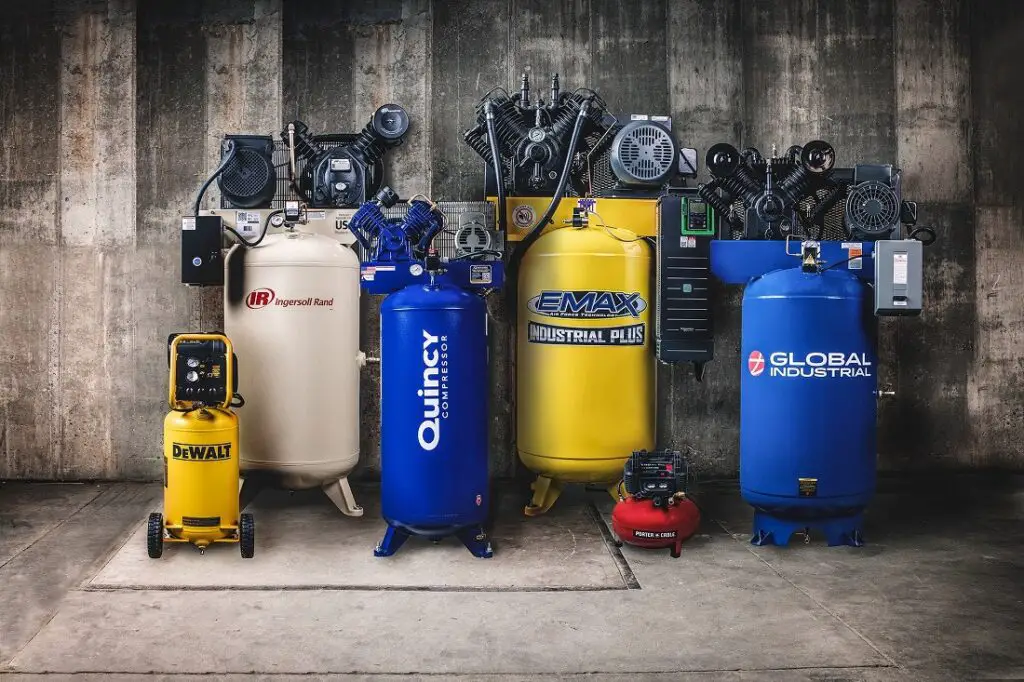
When you observe an excessive amount of moisture inside the compressor, this is quite disturbing. In essence, it occurs as air, heat, and pressure levels develop. The more heated the air is, the more water in the tank will hold.
Highly compressed air cannot carry much water vapor, and the extra water condenses inside the system. To solve the issue, we chose to use a dryer. All over the machine, the broken condensate drain valve is the main issue that causes excessive amounts of moisture. Now let’s talk about the possible reasons that generate excessive moisture.
1. Environment matters a lot
- Air contains moisture, but humid air contains more than that. The absorbance of your compressor determines the moisture level.
- However, start by relocating your compressors to a less humid location.
- You can use your compressors indoors.
- To lessen moisture, you can also utilize a refrigerator or fridge air dryer.
- The use of a desiccant air dryer is another option if you require a steam-free working environment.
- Also, membrane or deliquescent dryers are effective at reducing excessive moisture.
2. Machine parts malfunction
Sometimes your machine’s internal parts become weakened because of moisture. When you miss maintaining the compressor, the system loses its ability to remove water with time and becomes less effective.
3. An oversized tank
Sometimes the compressor becomes heated and warms faster when you use it more than the capacity level. Usually, piston compressors produce more heat. So, get a large air compressor or a separation system to solve this problem. The desiccant separator will help you remove the water and moisture.
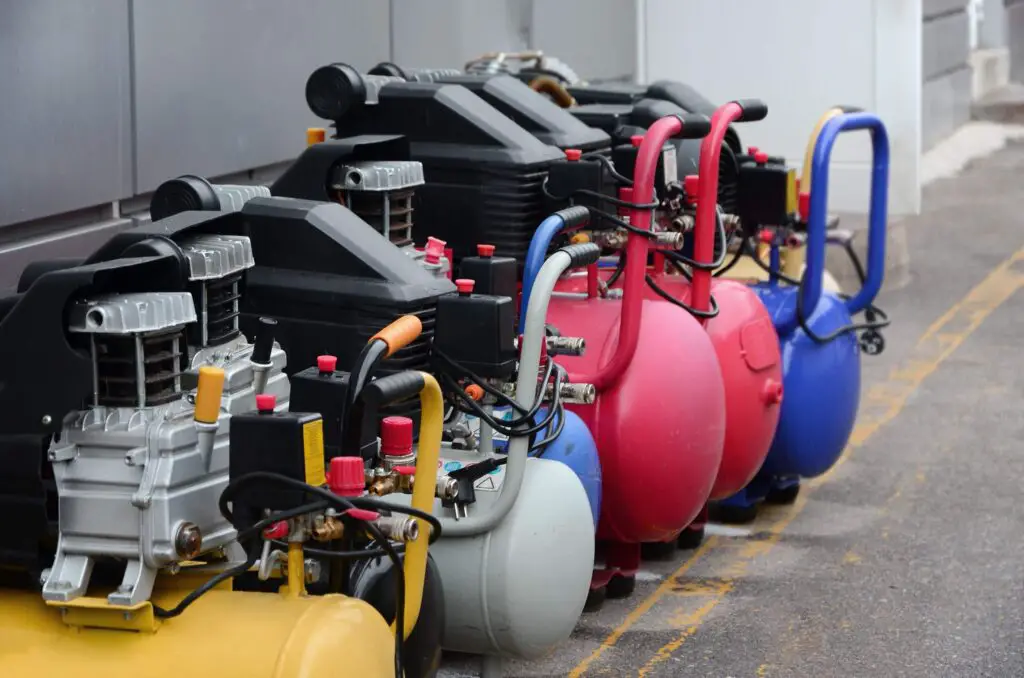
How to drain water from your air compressor: 8 Best Steps
Although water is a contaminant of pressurization, that doesn’t mean it should be avoided. There are a number of ways to remove water from air compressor systems. Let’s see the ideas!
Step 1. Check the temperature
You should check the input temperatures. If you notice it exceeds the dryer’s recommended level, which is 100° F, the dryer will be overloaded.
Step 2. Check level of water
Also, some dryers can’t manage the extra water since the amount of water vapor in the air doubles every 20° F.
Step 3. Determine the drainage
You should determine the drainage from the compressor and dryer water separator.
Step 4. Repair a leaky compressor
In the case of an air conditioner, you can quickly repair a leaky compressor by removing it and applying the leak sealant to the inside tank. After that, turn off the compressor.
Step 5. Let water blow out
Let the condensate water blow out by slightly opening the drainage outlet. Furthermore, make sure the tank is empty after blowing water.
Step 6. Maintain your machine properly
As we’ve already mentioned, you can use dryers, a water trap, or a piping system. Maintain your machine properly and keep an eye on it whenever you use it.
Step 7. Use aftercooler
An aftercooler eliminates the majority of the moisture produced during cooling and cools air from 200 to 350°F to a manageable temperature that is 15 to 20°F above the air temp.
Step 8. Use filter regulator lubricator
Another great option is using the FRL, or filter regulator lubricator, to remove water.
Want to know if you can fill HPA tank with air compressor? Read full answers to all your questions in related article here.
How to dry my compressed air: 7 Effective Ways
- Drain the tank on a daily basis.
- Use a filter regulator or water trap.
- Process of cooling storage tanks.
- Drying through absorption.
- Purchase a deliquescent air dryer, a desiccant dryer, or a refrigerator dryer.
- Air dries through a piping system.
- Use an aftercooler until temperature equilibrium is achieved when heat transfers between two masses of air with different temperatures. You can follow the air-cooled after-cooler or water-cooled after-cooler.
FAQs
What happens if water enters an air compressor?
Generally, if water enters, it will cause moisture to be drawn back into the compressed air stream. The water inside of an air compressor damages the air compressor and components attached to the machine. Water or moisture causes pipes to rust and also mixes with compressor oil and dirt particles to slow down machinery while it is working.
How do I get the moisture out of my air compressor?
1. Keep the compressor somewhere less humid.
2. Set up an external or internal air dryer. Use a refrigerator or fridge dryer to remove moisture from the air, or a desiccant dryer is excellent for steam-free utilization places.
3. More options like membrane or deliquescent dryers also work well to lower the moisture level.
4. Purchase a water trap to capture condensation from the compressed air.
5. Piping systems are beneficial when dealing with moisture problems.
How long can you leave air in an air compressor?
Actually, it depends on the type and capacity of your compressor. However, you can leave it running for a short while, all day for seven days. However, keep in mind that the compressor will continue to run if there are no production activities during these times, ultimately causing leaks and other load issues like air-consuming material left on or air dryer refinement.
How often should I drain my compressor?
It is better to drain the air compressor wet tank after every use as it can remove the possibility of corrosion and enhance the lifespan. So, you can open the drain valve for a while to let the moisture or condensation out.
Final Words
Anyway, it’s time to close the entire article. So the question was, “Can an air compressor get wet?” And the answer is yes, it can get wet, and there are various reasons like pressure or temperature rising, capacity issues, and environmental issues that generate water or moisture to make the compressor wet.
We have also brought info about how to repair and how to replace the compressor. Now you know the complete guidelines and fixing issues regarding the air compressor. We hope you won’t have to ask for any further clarification regarding the compressor wetness issues and solutions. We have shared everything with detailed information. So, fix your problem now!
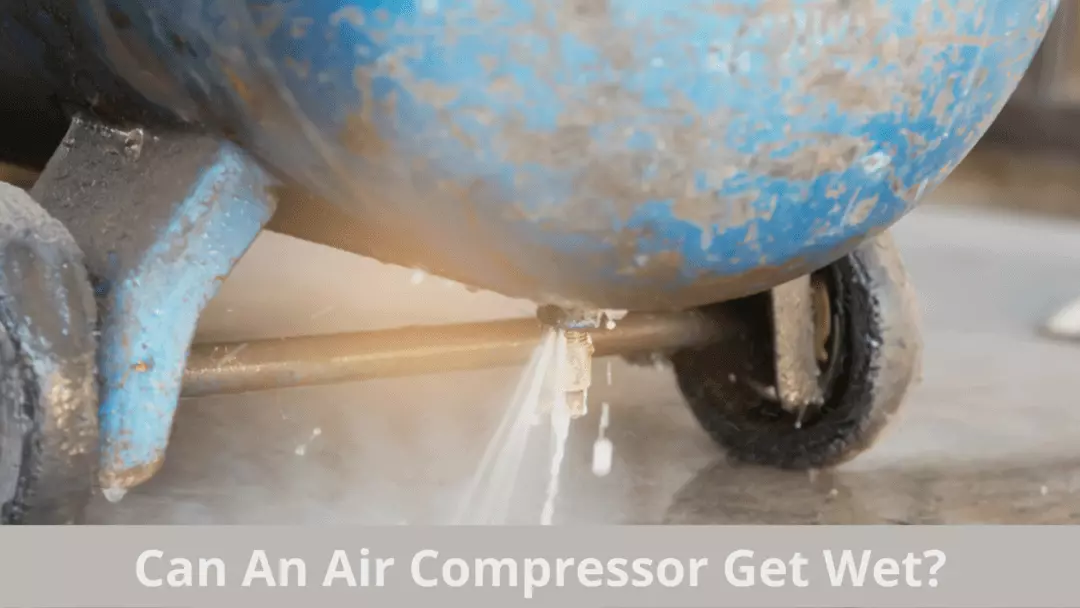
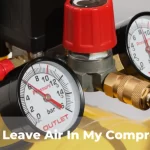

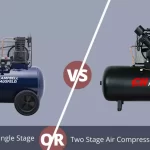
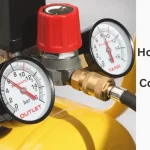

1 thought on “Can an Air Compressor Get Wet – Full Answers to All Questions”